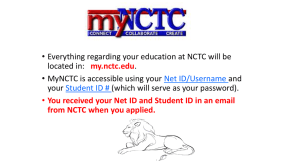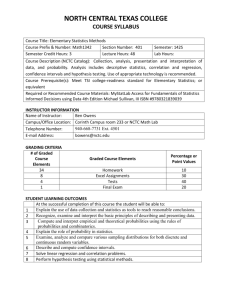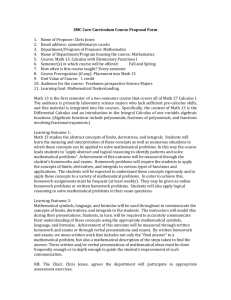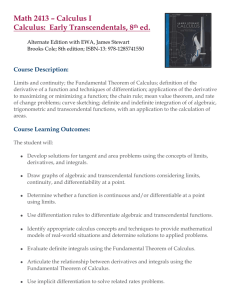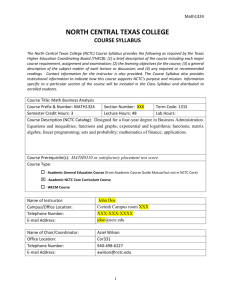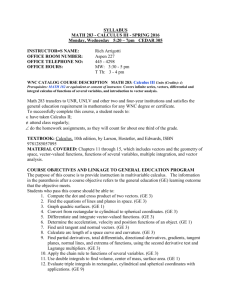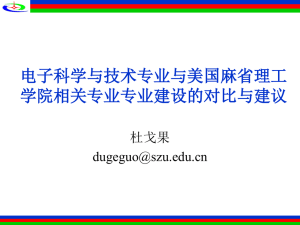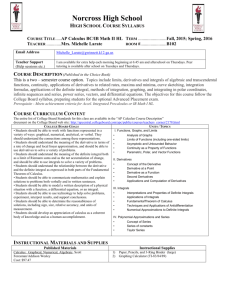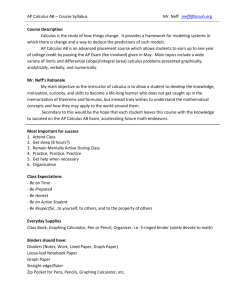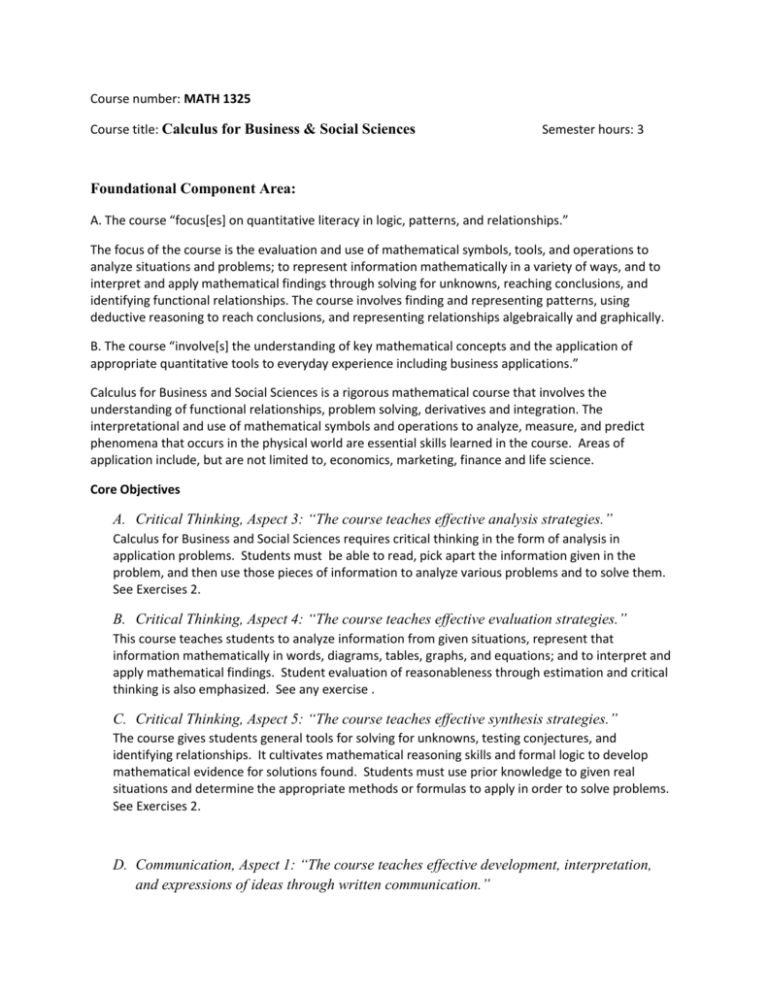
Course number: MATH 1325
Course title: Calculus for Business & Social Sciences
Semester hours: 3
Foundational Component Area:
A. The course “focus[es] on quantitative literacy in logic, patterns, and relationships.”
The focus of the course is the evaluation and use of mathematical symbols, tools, and operations to
analyze situations and problems; to represent information mathematically in a variety of ways, and to
interpret and apply mathematical findings through solving for unknowns, reaching conclusions, and
identifying functional relationships. The course involves finding and representing patterns, using
deductive reasoning to reach conclusions, and representing relationships algebraically and graphically.
B. The course “involve[s] the understanding of key mathematical concepts and the application of
appropriate quantitative tools to everyday experience including business applications.”
Calculus for Business and Social Sciences is a rigorous mathematical course that involves the
understanding of functional relationships, problem solving, derivatives and integration. The
interpretational and use of mathematical symbols and operations to analyze, measure, and predict
phenomena that occurs in the physical world are essential skills learned in the course. Areas of
application include, but are not limited to, economics, marketing, finance and life science.
Core Objectives
A. Critical Thinking, Aspect 3: “The course teaches effective analysis strategies.”
Calculus for Business and Social Sciences requires critical thinking in the form of analysis in
application problems. Students must be able to read, pick apart the information given in the
problem, and then use those pieces of information to analyze various problems and to solve them.
See Exercises 2.
B. Critical Thinking, Aspect 4: “The course teaches effective evaluation strategies.”
This course teaches students to analyze information from given situations, represent that
information mathematically in words, diagrams, tables, graphs, and equations; and to interpret and
apply mathematical findings. Student evaluation of reasonableness through estimation and critical
thinking is also emphasized. See any exercise .
C. Critical Thinking, Aspect 5: “The course teaches effective synthesis strategies.”
The course gives students general tools for solving for unknowns, testing conjectures, and
identifying relationships. It cultivates mathematical reasoning skills and formal logic to develop
mathematical evidence for solutions found. Students must use prior knowledge to given real
situations and determine the appropriate methods or formulas to apply in order to solve problems.
See Exercises 2.
D. Communication, Aspect 1: “The course teaches effective development, interpretation,
and expressions of ideas through written communication.”
The course teaches students to translate and interpret verbal, graphical and functional
representations of a phenomenon. Students learn to create functions that model real world
applications. Students will also be able to express the meaning of solutions and explain concepts in
writing. See Exercise 2.
E. Communication, Aspect 3: “The course teaches effective development, interpretation,
and expressions of ideas through visual communication.”
Displays of graphs and charts are essential to success in calculus as tool in visually
organizing, structuring, and interpreting information. Calculus for Business and Social
Sciences teaches the application of limits and derivatives to sketch visual representations
of functional relationships. See Exercises 1, 3, & 4
F. Empirical and Quantitative Thinking, Aspect 1: “The course teaches the manipulation of
numerical data or observable facts.”
Students in calculus must effectively read, set-up, analyze, and manipulate data in order to solve
various mathematical problems. See Exercise 3
G. Empirical and Quantitative Thinking, Aspect 1: “The course teaches the manipulation of
numerical data or observable facts.”
Students must analyze the information given in problems, and then use those pieces of data in order
to devise an equation (in the form of a limit, derivative, or integral) and then explain their
conclusions using proper mathematical language. See any Exercise.
H. Empirical and Quantitative Thinking, Aspect 3: “The course teaches the use of
observable facts to reach informed conclusions.”
Students will create models of real world situations and apply appropriate techniques to solve
application problems. The students must predict outcomes and interpret the results to show
that they have reached an informed conclusion. See Exercise 4.
Assignment Examples
7 x 1 for x 0
2 x 3 for x 0
1. Find the x-values at which f is not continuous if f x
2. The demand equation for a monopolist’s product is p = 3600 – 3q, where p is the price per unit
(in dollars) when q units are demanded.
a) Find the marginal revenue when 10 units are sold.
b) Explain the concept of marginal revenue around 10 units.
3. Graph, shade, and find the area bounded by the curves 𝑦 = 2𝑥 + 3 and y = x 2
4. Graph the function 𝑓(𝑥) = 𝑥 3 − 6𝑥 2 + 9𝑥 after finding the following:
a) the y-intercept and the x-intercept(s)
b) the interval(s) where the graph is increasing and decreasing.
c) the relative maximum and the relative minimum.
d) Graph the function.
NORTH CENTRAL TEXAS COLLEGE
COURSE SYLLABUS
The North Central Texas College (NCTC) Course Syllabus provides the following as required by the Texas
Higher Education Coordinating Board (THECB): (1) a brief description of the course including each major
course requirement, assignment and examination; (2) the learning objectives for the course; (3) a general
description of the subject matter of each lecture or discussion; and (4) any required or recommended
readings. Contact information for the instructor is also provided. The Course Syllabus also provides
institutional information to indicate how this course supports NCTC’s purpose and mission. Information
specific to a particular section of the course will be included in the Class Syllabus and distributed to
enrolled students.
Course Title: Business Calculus
Course Prefix & Number: MATH1325
Section Number: XXX
Term Code:131S
Semester Credit Hours: 3
Lecture Hours: 48
Lab Hours:
Course Description (NCTC Catalog): Limits and derivatives; indefinite and definite integrals; curve
sketching; optimization and other applications.
Course Prerequisite(s): MATH1324 or MATH1314
Course Type:
- Academic General Education Course (from Academic Course Guide Manual but not in NCTC Core)
- Academic NCTC Core Curriculum Course
- WECM Course
Name of Instructor:
John Doe
Campus/Office Location:
Corinth Campus room XXX
Telephone Number:
XXX-XXX-XXXX
E-mail Address:
jdoe@nctc.edu
Name of Chair/Coordinator:
Aziel Wilson
Office Location:
Cor331
Telephone Number:
940-498-6227
E-mail Address:
awilson@nctc.edu
REQUIRED OR RECOMMENDED COURSE MATERIALS
Introductory Mathematical Analysis for Business, Economics and the Life and Social Sciences, Ernest F.
Haeussler, Jr., Richard S. Paul, and Richard J. Wood, 13th edition,
Pearson Prentice Hall, Inc., 2011 or MyMathLab access code
COURSE REQUIREMENTS, EVALUATION METHODS AND GRADING CRITERIA
# of Graded
Course Elements
Graded Course Elements
Percentage or
Points Values
20
Homework
XX
10
Quizzes
XX
5
Tests
XX
1
Final Exam
XX
ATTENDANCE POLICY
TENTATIVE TEST SCHEDULE
OTHER PERTINENT INFORMATION
INSTITUTIONAL LEARNING GOALS
A quality general education curriculum in all associate degree programs.
Quality freshman and sophomore level courses in arts and sciences which parallel the lower
division offerings of four-year colleges and universities.
Quality technical programs leading directly to careers in semi-skilled and skilled occupations,
and quality technical education programs up to two years in length leading to certificates and
associate degrees.
Quality programs and services in support of adult literacy and basic skills development as a
mean of workforce enhancement and expanding access to higher education.
PROGRAM PURPOSE STATEMENT
NCTC seeks to implement its goal of offering quality general education curriculum in all associate
degrees by offering a core of general education courses designed to help students achieve academic,
career and lifelong goals. Acquiring knowledge, thinking critically, and utilizing the methodologies of
various disciplines exposed students to experiences that serve to advance their personal growth. The
chief focus of the General Education Core Curriculum at NCTC is to emphasize Exemplary Educational
Objectives and Basic Intellectual Competencies.
DEPARTMENTAL PURPOSE STATEMENT
NCTC’s Mathematics and Physics Department will teach courses that enable students to solve abstract
and concrete problems within a logical system in order to aid students in the pursuit of their academic,
professional, and civic goals.
STATEMENT OF SKILLS AND KNOWLEDGE EXPECTED OF NCTC GRADUATES
NCTC seeks to implement its goal of offering a core of general education courses designed to help
students achieve academic, career and lifelong goals. The chief focus of the General Education Core
Courses at NCTC is to emphasize basic intellectual competencies and broad intellectual perspectives.
CORE CURRICULUM COMPONENT AREA
The overall objective of the Mathematics component area is to develop a quantitatively literate college
graduate. Every college graduate should be able to apply basic mathematical tools in the solution of
real-world problems.
MATHEMATICS: CORE OBJECTIVES (COs)
Critical Thinking Skills
To analyze, evaluate and synthesize information effectively
Communication Skills
To demonstrate effective development, interpretation, and expressions of ideas through written and
visual communication.
Empirical and Quantitative Skills
To demonstrate effective manipulation and analysis of numerical data or observable facts to reach
informed conclusions.
STUDENT LEARNING OUTCOMES
EEO
Student Learning Outcome
At the successful completion of this course the student will be able to:
M1-7
Develop solutions for tangent and area problems using the concepts of limits, derivatives, and
integrals
M1-7
Draw graphs of algebraic and transcendental functions considering limits, continuity, and
differentiability at a point.
M1-7
Determine whether a function is continuous and/or differentiable at a point using limits.
M1-7
Use differentiation rules to differentiate algebraic and transcendental functions.
M1-7
Identify appropriate calculus concepts and techniques to provide mathematical models of
real-world situations and determine solutions to applied problems.
M1-7
Evaluate definite integrals using the Fundamental Theorem of Calculus.
M1-7
Articulate the relationship between derivatives and integrals using the Fundamental Theorem
of Calculus.
GENERAL DESCRIPTION OF SUBJECT MATTER FOR EACH LECTURE/DISCUSSION
Topic
General Description of Subject Matter
Business Calculus
Develop solutions for tangent and area problems using the concepts of limits,
derivatives, and integrals
Business Calculus
Draw graphs of algebraic and transcendental functions considering limits,
continuity, and differentiability at a point.
Business Calculus
Determine whether a function is continuous and/or differentiable at a point
using limits.
Business Calculus
Use differentiation rules to differentiate algebraic and transcendental
functions.
Business Calculus
Identify appropriate calculus concepts and techniques to provide
mathematical models of real-world situations and determine solutions to
applied problems.
Business Calculus
Evaluate definite integrals using the Fundamental Theorem of Calculus.
Business Calculus
Articulate the relationship between derivatives and integrals using the
Fundamental Theorem of Calculus.
Last day to Withdraw
For the Fall 2013 semester, the last day to withdraw from a course with a “W”
is November 16, 2013.
Student Rights &
Responsibilities
NCTC Board policy FLB (Local) Student Rights and Responsibilities states that
each student shall be charged with notice and knowledge of the contents and
provisions of the rules and regulations concerning student conduct. These
rules and regulations are published in the Student Handbook published in
conjunction with the College Catalog. All students shall obey the law, show
respect for properly constituted authority, and observe correct standards of
conduct.
Scholastic Integrity
Scholastic dishonesty shall constitute a violation of college rules and
regulations and is punishable as prescribed by Board policies.
Scholastic dishonesty shall include, but not be limited to cheating on a test,
plagiarism, and collusion.
STUDENT SUPPORT SERVICES
Disability
Accommodations
The Office for Students with Disabilities (OSD) provides accommodations for
students who have a documented disability. A disability is anything that can
interfere with learning, such as a learning disability, psychological challenge,
physical illness or injury. Accommodations may include extra time on tests,
tests in a distraction reduced environment, volunteer note taker in class, etc.
On the Corinth Campus, go to room 170 or call 940-498-6207. On the
Gainesville Campus, go to room 110 in the Administration (100) Building or call
940-668-4209. Students on the Bowie, Graham, Flower Mound, and online
campuses should call 940-668-4209 to arrange for an intake appointment with
OSD.
North Central Texas College is on record as being committed to both the spirit
and letter of federal equal opportunity legislation, including the Americans
with Disabilities Act (ADA) of 1990, ADA Amendments Act of 2009, and Section
504 of the Rehabilitation Act of 1973 (P.L. 93-112).
Student Success Center
The Student Success Center is designed to help all students at NCTC develop
tools to achieve their academic goals. The center links students to FREE
tutoring, including a Writing Center, a Math Lab, and free online tutoring in the
evening. The program helps students acclimate to college by providing
students free interactive workshops about Time Management, Study Skills,
Test Anxiety, and much more. For more information, please visit your nearest
Student Success Center.
Financial Aid,
Scholarships, and
Veterans Services
The Financial Aid Office is responsible for administering a variety of programs
for students who need assistance in financing their education. The first step
for financial aid is to complete a FAFSA. For more information, please visit
your nearest Financial Aid Office.
Tobacco-Free Campus
NCTC restricts the use of all tobacco products including cigarettes, cigars, pipes
and smokeless tobacco on campus property. NCTC is aware that tobacco use
influences underage students which cumulates unsightly tobacco litter and
interferes with assuring clean air for all who come to NCTC. NCTC recognizes
the health hazards of tobacco use and of exposure to second hand smoke.
Information on a tobacco cessation program is available for students, faculty,
staff who wish to stop using tobacco products. We would like to "thank you"
for your help in making our campuses Tobacco-Free. For questions or concerns
please contact the Office of Vice President of Student Services at
940.668.4240.


